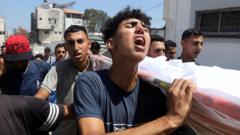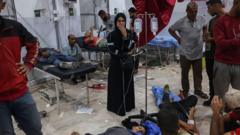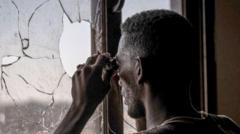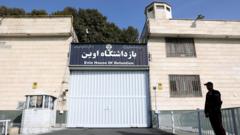Armed Israeli security forces closed three schools in Shuafat refugee camp, sending hundreds of students home and prompting widespread condemnation from UN officials and the Palestinian Authority over violations of educational rights.
Closure of UN Schools Sparks Outcry Over Palestinian Education Rights

Closure of UN Schools Sparks Outcry Over Palestinian Education Rights
Israeli forces forcibly shut down UN-run schools in East Jerusalem, raising concerns over education access for Palestinian students.
In a contentious move that has elicited widespread condemnation, Israeli security forces forcibly closed three UN-run schools in the Shuafat refugee camp, located in Israeli-annexed East Jerusalem. This action occurred just after classes commenced on Thursday morning, disrupting the education of hundreds of Palestinian students.
Philippe Lazzarini, the Commissioner-General for the UN Relief and Works Agency for Palestine Refugees (UNRWA), criticized the closure as a violation of children's fundamental right to education and described it as a "blatant disregard of international law." The current Israeli ban on UNRWA, initiated earlier this year, is based on accusations that the agency has ties to Hamas—claims that UNRWA vehemently denies, emphasizing its commitment to neutrality.
Videos circulating on social media captured scenes of girls embracing each other outside the shuttered schools. The closure order, affixed to one school's wall, explicitly banned any educational activities or the presence of students, an edict that led over 550 children aged six to 15 to be sent home. Reports indicated a staff member was detained during the closure, leaving young children traumatized and at risk of losing valuable educational opportunities.
In addition to the Shuafat schools, Israeli police were dispatched to three other educational institutions in East Jerusalem, resulting in further school dismissals. Lazzarini, using the social platform X to express his outrage, condemned the closures and asserted that "these schools are inviolable premises of the United Nations," underscoring the need for their continued operation to protect an entire generation's right to learn.
The Palestinian Authority condemned the closures as a violation of children's rights to education, echoing sentiments from the UK consulate in Jerusalem and several international stakeholders, who expressed solidarity with the affected families and educators. The diplomatic statement emphasized that Israel bears responsibilities under international humanitarian law to facilitate educational operations for children.
UNRWA celebrates its longstanding presence in East Jerusalem, having operated under its UN General Assembly mandate since 1950. However, recent legislation passed by the Knesset has restricted contacts between Israeli officials and UNRWA, further complicating the organization's efforts within Israeli territories.
The geopolitical backdrop is tense, as Israel claims East Jerusalem, along with the rest of the West Bank, following the 1967 Middle East War, a move that has not gained recognition from the majority of the international community. While Israel views the entire city as its capital, Palestinians aspire to designate East Jerusalem as the capital of their anticipated state.
Approximately 230,000 Israeli settlers currently reside in East Jerusalem alongside an estimated 390,000 Palestinians, with the international community largely considering settlements in the area illegal—a stance supported by a recent advisory opinion from the International Court of Justice (ICJ).























